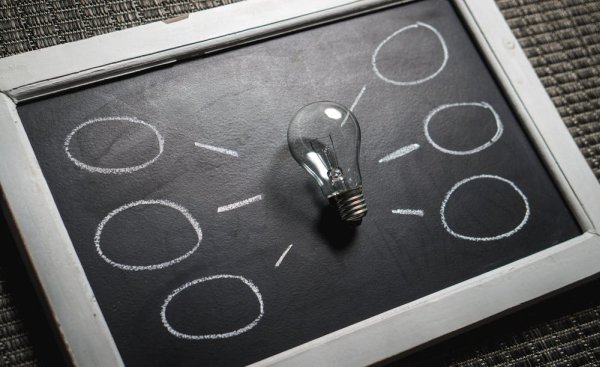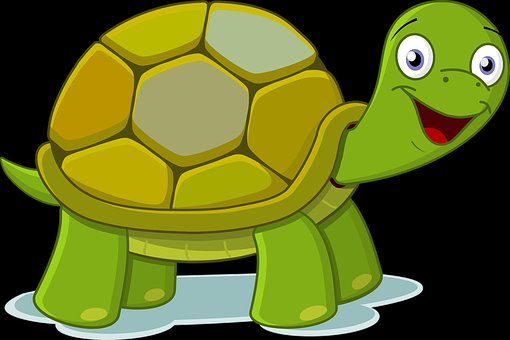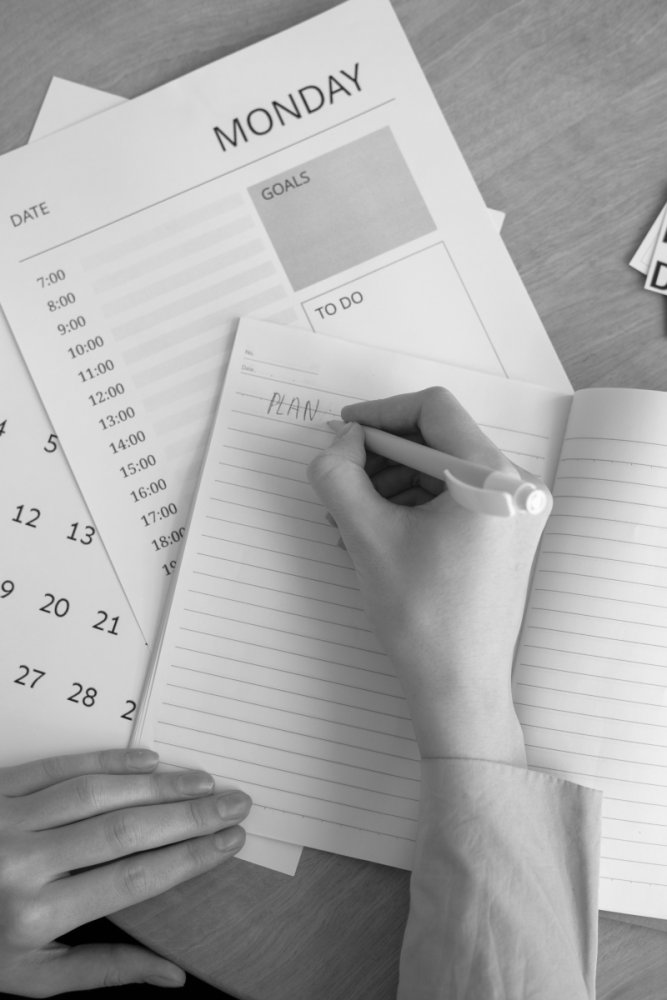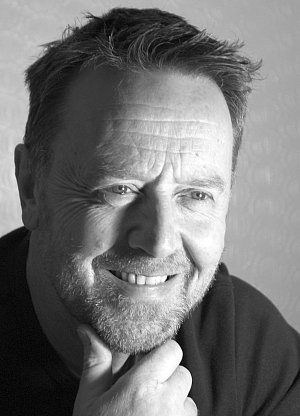TAG: TIPS LOSE WEIGHT
WEIGHT LOSS PLANNING
Understanding the big picture

It’s not enough to go on a diet and hope for the best.
We have to understand what’s going on in our bodies and have a cunning plan (more of that in a minute).
plan hard - slim easy
Only in the past 70 years have we had fridges stocked full of delicious fast foods fried foods, fizzy drinks, sugar & starchy carbs and over-abundant meat feasting. IT'S NOT NORMAL!
Food moguls put profit over health and have hypnotized us into eating in an unnatural way for our (still stone-age) metabolisms.
So our hunter-gatherer bodies (which evolved to exercise daily and eat less often) are stuck in this trap made by clever marketers.

Many people make huge efforts to diet, have temporary success only to gain back all the weight. Thats because they don't understand their own bodies.
So let's plan hard and slim easy. Simply put, we have to cleverly to re-adapt our straining metabolisms.
That’s where the cunning plan comes in….
The cunning plan!
There are 3 sections to our plan (all as important as each other):-
2. Eating Window
3. Exercise/Movement
1. Food & Drink input
Getting help from Weight Watchers and/or Slimming World is a great way to kick start this part of the plan and gives lots of moral support.
We must remember though that dietary adaptations can't be made overnight or in a week or two. We need to plan as if we were beginning training for a marathon and had a plan of six months of gradual adaptation before we could run that distance. In the same way, the body takes time to re-adapt itself to new dietary inputs.
Warning: Be careful not to go along with the over-emphasis on losing weight quickly.

It may be in WW's/SW's interests to whoop over success on the scales, but it might not be in your best interests to get sucked into this fervor as you are playing the cunning long term game.
So we must carry out these food and drink adaptations slowly but surely.
Be the tortoise not the hare.
how to plan a weight loss schedule
We simply make a plan of where we want to be in six months, ie, write up our ideal eating (and drinking) program, then week by week over 26 weeks we can then write a gradual adaptation plan: from where we are now to where we want to be in this new lifestyle choice.
Example:
Say if your ideal eating program said that you were not going to be drinking any fizzy soda drinks in 6 months time, and currently you drink 12 glasses per week, then after three months you would only be looking to be drinking six glasses per week and so on. Rinse and repeat for everything that currently ends up in your tummy.

When we plan gradual changes, the body has time to adapt bit by bit. Imagine we tried to run a marathon after, say, two weeks of bootcamp training. We'd feel terrible and fail horribly. Likely we'd give up running altogether. It's a bad plan, it's not structured or sensible.
So go ahead and make a plan of what your food and drink input should ideally look like. Do the maths and make a plan over 6 months which graduates you from your current input to the way you know is a better way.
keto or not keto?
Alongside this planned approach, remember that there is evidence that re-adapting the body to a lower starchy carb intake and giving the body more natural wholesome fats, such as found in avocados and nuts for example, is a better plan for maintaining weight loss in the long run.
This eating approach moves our bodies away from being adapted to starchy carbs and sugars (not natural for us humans) towards being adapted to a more natural metabolism (which burns our fat reserves). But again, we can't do this suddenly, we have to be gradual.

Other eating regimes come into this area - get to know what is meant by an 'anti-inflammatory' way of eating (mainly using whole, unprocessed foods). Also, there's the Mediterranean, plant based and paleo diets. Explore these and get to know what they offer.
All these plans are going in the same direction - getting people to forsake processed foodstuffs, fast and deep fried meals, sugars/starchy stuff and going towards wholesome, healthy choices.
2. eating window

The improvement in metabolic health (including weight loss) from eating within a time restricted window is now well established science.
Doctors and scientists are recommending to restrict eating and drinking to a 7-10 hour time frame (the shorter the better) - that means we don't eat for 14-17 hours overnight.
Example:
Finish eating at say 6.30pm in the evening, and not eating again until 11.30am the next morning would be a 7 hour eating window and a 17 hour fasting period.
This has proven to have health benefits and aid weight loss. Why? Because it's natural to the human species.
Simply put, once again this strategy harks back to our strange caveman metabolism where our ancient ancestors had an eating pattern that went a bit like this:
Not much food around (certainly no bread, pasta, not much in the way of sugar or potatoes). Quite a lot of plant-based gathering going on. Get what we could in the day. Go to bed at sundown. Wake up, spend a few hours looking for food, Eat what we could find. Catch some animals very occasionally, scavenge some bone marrow from a dead carcass that the predators left (and hope not to be part of that predator's food chain).
We haven't had time to evolve to cope with the current food abundance, we still have a body metabolism based on ancient routines.
When we change this natural pattern, we are innocently self-harming, thinking it's the way life should be.
remember
as long as we have insulin in our system, we can't burn any of our fat reserves.
insulin arrives whenever we eat.
Intermittent fasting gives us the chance to actually use up some of those unwanted fat cells
3. exercise /movement
Yes, you get the picture by now.....
Humans have evolved to be constantly on the move. When we don't move every day, we get sick.
We all wish it was another way because we like resting and relaxing.
But it isn't so we have to move our bodies. A lot. We don't have to do HIIT classes or bootcamps or beast ourselves. If we have gained too much weight, we can't work in this high intensity zone anyway.
We work within the fat burning zone.
We walk. And we can do the right type of tummy exercises (not the wrong ones.
If we are on a weight loss plan, we have to gradually build up to walking for 60 minutes per day, most days. Again, this has to be built up gradually over a carefully planned out 6 month period to give our bodies time to adapt. If we prefer dancing, we can substitute some dancing for walking.
If an hour a day seems like a lot out of our busy days, well, it is if we compare it with the sedentary norms of our modern society, but it is a tiny amount compared with how much our ancestral bodies actually moved back in the day.
Think of it this way: our bodies are amazing machines that give give give. Don't we owe ourselves this small favour as a way of giving back. Our taste buds are the selfish ones, our bodies are selfless victims.

Timewise, we may be able to reduce this hour per day of walking type intensity exercise to a lower maintenance level, or do less frequent, higher intensity HIIT type of exercises once a target weight/fitness level is reached.
During the early months, working in the fat burning zone (e.g. walking) will help us and trying to do bootcamp (no pain no gain) will hinder us.
to sum up
Use the knowledge here on this page to write a cunning plan for weight loss which encompassed the 3 areas explained: 1. food & drink input, 2. eating window and 3. exercise/movement.
These three have to worked on together as one unit, otherwise results will not be as desired.
Please get away from thinking 'diet'. As diets are always temporary but the changes we need to make are permanent.
That reason is that we are modern humans still living in bodies not at all designed for modern society with it's food abundance.
Once we 'get' this fact, we are more knowledgeable than 99% of others living in the western world. This gives us an edge in the waist race - so we can now plan hard and slim easy.
tAg: Tips lose weight
about the author

Tags: Tips lose weight
My name is Peter Holland co-creator of Zen 02. I am a trainer & weight loss coach, qualified at Level 4 QFC. I have been the Active Aging Lead for David Lloyd and a 3rd Dan Karate Instructor.
More to the point, I have had my own struggles with weight and food and so know the inside track on that.
Let's have a chat - no obligation, totally free . . .
And I'll give you some pointers to good health for body and mind.
Just fill in the form below:-
Here's the 'Little Things' idea:
Little things can have big consequences. Some ideas change the balance in your head . . .
Enough to bring the walls tumbling down.
Why is it that some ideas hit the spot and others don't?
Well, it's called micro-learning.
Some people want to change but they try to take on too much.
We need to build in baby steps, otherwise we crash and burn and are back to square one.
Then, the small things start to add up and gradually, you start to discover a new version of you.
It's you; version 2.0.
How do I keep this tipping point? I think I've worked it out. Everything is explained in my 3G's System.
1. Grasp it!
2. Get Ready!
3. Go!
End of video transcript.
A little more detail about my 3 G's system
Grasp it!
Let's explain:
Knowledge is power. In this case, the power to change.
Everyone is different. People need individually tailored guidance. Each person has a gap in their knowledge, no matter how well informed.
Some people know a lot about weight loss. They just can't put it into practice.
Others don't know much and are raring to go once they get one or two lightbulb moments.
There are some common misconceptions. These are traps, often sprung by the mass media looking to sensationalise.
Or by snake oil salesmen looking for a quick buck. This is why I say "Good tips lose weight, bad tips gain weight" .
- Beware the fad diet perpetrator,
- Be sceptical about angled articles from junk journos.
So 'Grasp It!' is about knowing what you need to know and what you need to safely ignore.
You need to know about your own split personality.
Split Personality
ALL humans are designed to have two different and separately operating minds (according to Prof Steven Peters - a leading psychiatrist.).
Often these conflict. Seems like a design fault? But no, we need both parts to do what they do.
Grasping this concept and knowing when the conflict hurts you is key.
Example of the two minds conflict:
Your taste buds (affiliated to the emotional sector) want what they want, and want it NOW! They have no wellbeing worries in the slightest. Your poor old gut and inner workings have no say unless you get the other mind to talk some sense; like a worried parent. What's the key to winning this conflict? Knowing exactly how habit change works.
So you need to know just enough about the science of your own body.
The Science of Your Own Body
Knowing just the right amount of biology and number crunching about you, won't be confusing or bad.
Let's go 'Goldilocks'. Not too hot on science, not too cold.
Once you understand some basic numbers and scientific principals, you can start to use some simple but ever so effective tools in your favour.
Studies show that for most, this makes one heck of a difference to your long term weight management success. Although some articles refute this, I disagree with them: see the evidence for yourself.
Example of necessary science:
BMI, caloric balance, Schofield formula: The triad of terrors are not too bad. It's my job to unwrap these gifts to your body.
get ready!
Let's explain:
Like I said, some people have 'the knowledge', but they refuse to drive the taxi.
Nothing can help these people, not even me. There's a lot of them out there.
Are you one of them? I was.
Just for the record, we're classified by psychologists as being in the 'pre-contemplation phase'.
If you don't like being classified, may I suggest doing something about it, because eventually, you may get on the wrong side of health risks you are taking.
My own take on this is a bit simpler - people, including myself, get into the 'comfort zone'.
If you can force yourself out of this cosy little corner, you'll not only look much more like you want to look, you vain thing you, but you'll be on the right side of your doctor's appointments.
Sorry for the tough love, but I want to help those in the contemplation and action stages as the comfort zone kings and queens are untouchable.
Example of 'Get Ready!'
"Get Ready!" , in part, means setting realistic goals that are actually doable. Not living in a fantasy world of where you would love to be at some mystical time in the future.
SMART goals are measurable and, let's be honest, really fun to actually achieve and tick off one by one.
Go!
Let's explain:
The 'Go!' part of my programme is about taking your diary, and making appointments with yourself and allocating time to your fitness and wellbeing programme.
Not forgetting you need to write a programme in the first place.
The key is not build those baby blocks and not go all guns blazing making resolutions destined to fail at the first, second or third hurdle.
Example of 'Go!'
Either yourself, or , preferably, with a specialist and qualified weight loss trainer like myself, make a steady, achievable12 week programme in terms of looking at food and exercise in combination, based on your 'Get Ready' workings out. When that 12 weeks is up, make another 12 week plan. And so on.
Important to remember that going back to old ways for a little bit does not constitute abandonment of the plan. Just get back on the horse and keep riding.
Good tips lose weight
"Good tips lose weight, bad tips gain weight"
Let's just explain what I mean by this exactly.
Good tips lose weight:
- Follow advice backed up by science.
- The latest science does change, but has to stand up to rigorous examination prior to general acceptance by Governments and the scientific community.
- When there is a consensus in the scientific community, the info gets published by the Government.
- Just because a daily rag publishes the results of a new scientific trial in sensationalist headlines, doesn't make the results valid.
- Trials can have certain biases written into them that skew results. That's why there needs to be a general consensus.
- Bad tips lose weight never (in the long run):
- Look out for:
- People who gain from selling fad diets.
- Newspapers who want to sell more papers, make headlines and get scoops.
- People who don't understand the importance and gravity of the Government's NICE guidelines (or bother to read them).
- Well meaning people who aren't really qualified in the field of weight management and metabolic diseases.
- Snake oil salesmen (and organisations) who offer you quick weight loss solutions. It never works out long term.
To summarise
Good tips lose weight:, bad tips lose weight never in the long run.
Make those little things the building blocks for the bigger, cumulative gains.
Habits can change, but they need time and accumulated, conscious practice before they set in.
